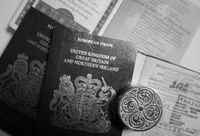The answer to the above question is unequivocally, NO. H-1B workers do not steal jobs from U.S. workers. In fact, an economy with a strong H-1B workforce will create jobs for U.S. workers and help the U.S. maintain international competitiveness.
There is a common misconception that H-1B workers steal jobs from U.S. workers and undercut wages; however empirical evidence reveals a vastly different story. The H-1B specialty occupation worker program has drawn the world’s best and brightest highly specialized workers into the U.S. labor market, strengthening the U.S. economy and promoting efficiency and stability into a wavering U.S. workforce. This article “debunks” the common myths surrounding the H-1B visa category and presents the truth about the H-1B program.
True or False?: H-1B Workers Steal Jobs from U.S. WorkersFALSE: H-1B specialty occupation workers do not steal jobs from qualified U.S. workers. Foreign-born H-1B temporary workers fill a void in the U.S. labor market by allowing U.S. companies to hire highly skilled foreign workers. The petitioning U.S. company is required to pay the higher of either the prevailing wage or actual wage paid to similarly situated American workers. Employment under the H-1B visa category is a volitional act made by U.S. employers who choose H-1B workers to help maintain a competitive workforce domestically and abroad.
H-1B Specialty Occupation DefinedThe H-1B visa category allows an employer to temporarily hire nonimmigrant workers in specialty occupations. Federal law defines specialty occupation as one requiring theoretical and practical application of a body of highly specialized knowledge in a field of human endeavor including, but not limited to, architecture, engineering, mathematics, physical sciences, social sciences, medicine and health, education, law, accounting, business specialties, theology, and the arts, and requiring the attainment of a bachelor’s degree or its equivalent as a minimum. This allows a U.S. company to hire highly skilled individuals to fill gaps in employment for temporary periods of time (in three-year increments for up to six years, with exceptions) while the U.S. labor market struggles to produce qualified workers. Even in the wake of the “great recession” international competitiveness in the U.S. economy depends greatly on the availability of H-1B workers from abroad.
True or False?: H-1B Workers Undercut the U.S. Labor Force by Providing Cheap LaborFALSE: Under the H-1B Visa program, the U.S. employer is required to pay the H-1B worker the higher of either the “prevailing wage” for the occupation within the location of employment or the “actual wage” paid to similarly employed U.S. workers. In addition, taking into account the legal and governmental fees associated with filing the H-1B petition (which are estimated at around $6,000) and the cost to sponsor an H-1B worker for her green card (which can cost as much as $10,000), hiring an H-1B worker is not a “cheap” endeavor. Again, hiring foreign labor under the H-1B visa category is a choice made by a U.S. employer. This choice is often made with the understanding that hiring one H-1B worker from abroad can, in fact, create U.S. jobs. Here’s how:
Opponents claim that H-1B workers depress wages and cause unemployment by taking jobs from American workers. However, H-1B workers keep American companies in the United States and create U.S. jobs through support staffing and the like. Bill Gates recently remarked in testimony before the U.S. House of Representatives, Committee on Science and Technology:
“If we increase the number of H-1B visas that are available to U.S. companies, employment of U.S. nationals would likely grow as well. For instance, Microsoft has found that for every H-1B hire we make, we add on average four additional employees to support them in various capacities.”
Add this to the fact that employers must show that they will pay the “prevailing wage” to H-1B workers and we begin to see the advantageous nature of the H-1B program. U.S. employers are under immense pressure to maintain profitability in the wake of the greatest economic downturn since the great depression. Competition is fierce both domestically and abroad. Hiring the best international talent vis-a-vis the H-1B visa program to work at U.S. companies to implement sophisticated company policy and procedures will keep the U.S. economy in first place among the world’s major players. It enables companies to stay in the U.S. and hire support staff to see that these policies and procedures and carried out. A U.S. labor market with high numbers of H-1B workers will ultimately grow the economy by increasing wages and reduced unemployment.
How to Contact UsIf you have questions about an H-1B visa or employment-based green card matter, and/or you need help in an immigration process, please contact our immigration attorneys or call The Law Firm of Shihab & Associates Co., LPA at the nearest office close to you to consult with an attorney. Our law firm handles various matters including Green Cards and Permanent Residence, family immigration, immigrant visas, non-immigrant visas, employment visas and H1B visas, Investor Visas, PERM applications, and many more. Please contact us and experience how our law firm can assist you in your immigration matters. Whether you are an employer, an employee or a family member, The Law Firm of Shihab & Associates, Co., LPA has competent, responsive and innovative lawyers who can make your immigration experience pleasant and seamless.

